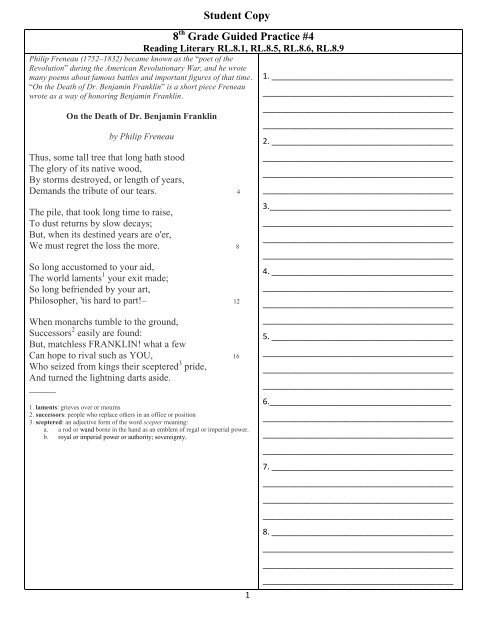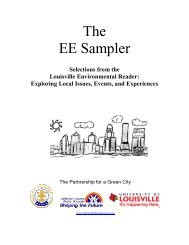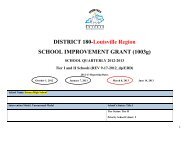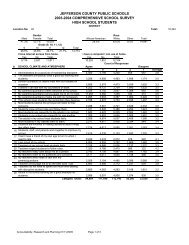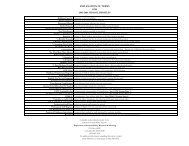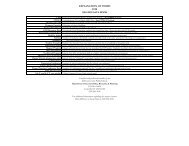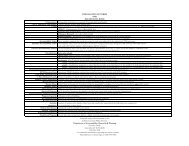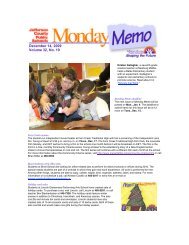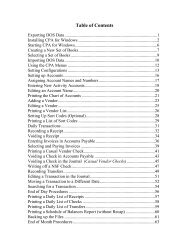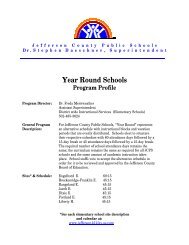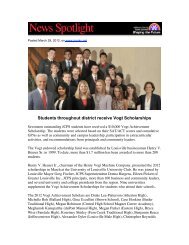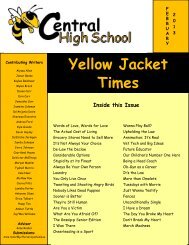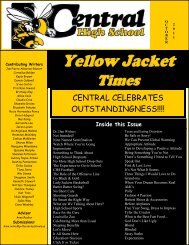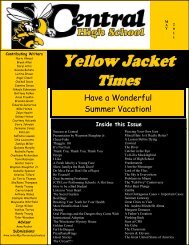Create successful ePaper yourself
Turn your PDF publications into a flip-book with our unique Google optimized e-Paper software.
Student Copy<br />
8 th Grade Guided Practice #4<br />
Reading Literary RL.8.1, RL.8.5, RL.8.6, RL.8.9<br />
Philip Freneau (1752–1832) became known as the ―poet of the<br />
Revolution‖ during the American Revolutionary War, and he wrote<br />
many poems about famous battles and important figures of that time. 1. _________________________________________<br />
―On the Death of Dr. Benjamin Franklin‖ is a short piece Freneau<br />
wrote as a way of honoring Benjamin Franklin.<br />
___________________________________________<br />
___________________________________________<br />
On the Death of Dr. Benjamin Franklin<br />
___________________________________________<br />
by Philip Freneau<br />
2. _________________________________________<br />
Thus, some tall tree that long hath stood<br />
The glory of its native wood,<br />
By storms destroyed, or length of years,<br />
Demands the tribute of our tears. 4<br />
The pile, that took long time to raise,<br />
To dust returns by slow decays;<br />
But, when its destined years are o'er,<br />
We must regret the loss the more. 8<br />
So long accustomed to your aid,<br />
The world laments 1 your exit made;<br />
So long befriended by your art,<br />
Philosopher, 'tis hard to part!– 12<br />
When monarchs tumble to the ground,<br />
Successors 2 easily are found:<br />
But, matchless FRANKLIN! what a few<br />
Can hope to rival such as YOU, 16<br />
Who seized from kings their sceptered 3 pride,<br />
And turned the lightning darts aside.<br />
______<br />
1. laments: grieves over or mourns<br />
2. successors: people who replace others in an office or position<br />
3. sceptered: an adjective form of the word scepter meaning:<br />
a. a rod or wand borne in the hand as an emblem of regal or imperial power.<br />
b. royal or imperial power or authority; sovereignty.<br />
1<br />
___________________________________________<br />
___________________________________________<br />
___________________________________________<br />
3._________________________________________<br />
___________________________________________<br />
___________________________________________<br />
___________________________________________<br />
4. _________________________________________<br />
___________________________________________<br />
___________________________________________<br />
___________________________________________<br />
5. _________________________________________<br />
___________________________________________<br />
___________________________________________<br />
___________________________________________<br />
6._________________________________________<br />
___________________________________________<br />
___________________________________________<br />
___________________________________________<br />
7. _________________________________________<br />
___________________________________________<br />
___________________________________________<br />
___________________________________________<br />
8. _________________________________________<br />
___________________________________________<br />
___________________________________________<br />
___________________________________________
Walt Whitman (1819–1892) wrote many uplifting poems about<br />
life in his collection Leaves of Grass, but he was also deeply<br />
affected by his experiences during the American Civil War.<br />
Abraham Lincoln was a man Walt Whitman deeply admired<br />
and is the captain to whom Whitman refers in this poem. As a<br />
result, it was Lincoln’s death that affected Whitman the most.<br />
This poem was written as a memorial to Abraham Lincoln who<br />
was, in Whitman’s opinion, the greatest president in United<br />
States history. ―O Captain! My Captain!‖ is an extended<br />
metaphor and was written after the assassination of President<br />
Abraham Lincoln, following the Union’s victory over the<br />
Confederacy.<br />
O Captain! My Captain!<br />
By: Walt Whitman<br />
O Captain! My Captain! our fearful trip is done,<br />
The ship has weather'd every rack, 4 the prize we sought is won,<br />
The port is near, the bells I hear, the people all exulting, 5<br />
While follow eyes the steady keel, the vessel grim and daring;<br />
But O heart! heart! heart!<br />
O the bleeding drops of red,<br />
Where on the deck my Captain lies,<br />
Fallen cold and dead. 8<br />
O Captain! my Captain! rise up and hear the bells;<br />
Rise up–for you the flag is flung–for you the bugle trills,<br />
For you bouquets and ribbon'd wreaths–for you the shores acrowding,<br />
For you they call, the swaying mass, their eager faces turning;<br />
Here Captain! dear father!<br />
This arm beneath your head!<br />
It is some dream that on the deck,<br />
You've fallen cold and dead. 16<br />
My Captain does not answer, his lips are pale and still,<br />
My father does not feel my arm, he has no pulse nor will,<br />
The ship is anchor'd safe and sound, its voyage closed and done,<br />
From fearful trip the victor ship comes in with object won;<br />
Exult O shores, and ring O bells!<br />
But I with mournful tread,<br />
Walk the deck my Captain lies,<br />
Fallen cold and dead. 24<br />
4. rack: a cause of extreme anguish or suffering<br />
5. exulting: rejoicing or celebrating<br />
―On the Death of Dr. Benjamin Franklin‖ by Philip Freneau, written in 1788 and<br />
published in American Poetry in 1918 by C. Scribner‘s Sons.<br />
2<br />
9.__________________________________________<br />
____________________________________________<br />
____________________________________________<br />
____________________________________________<br />
O Captain! My Captain!<br />
10.___________________________________<br />
______________________________________<br />
______________________________________<br />
______________________________________<br />
11.____________________________________<br />
______________________________________<br />
_______________________________________<br />
_______________________________________<br />
12.____________________________________<br />
_______________________________________<br />
_______________________________________<br />
_______________________________________<br />
13._____________________________________<br />
_______________________________________<br />
_______________________________________<br />
_______________________________________<br />
14.____________________________________<br />
_______________________________________<br />
_______________________________________<br />
_______________________________________
Part 2: Focus on Multiple Choice and Extended Response<br />
This section contains 4 multiple choice questions and one extended response question. Reread the poems,<br />
“On the Death of Dr. Benjamin Franklin” and “O Captain! My Captain!” Pay close attention to the form and<br />
structure of both passages. Think about how the author used the structure of the stanzas to contribute to the<br />
meaning of the story. Look for the authors’ points of view. Carefully consider evidence from the text to help<br />
you in selecting your answers. Then circle the correct answer for each multiple choice question. Complete the<br />
Extended Response question on a separate sheet of paper.<br />
1. Read the following line from ―O Captain! My Captain!‖<br />
―From fearful trip the victor ship comes in with object won;‖<br />
This line helps establish the historical outcome of the American Civil War. Which of the following lines<br />
from ―On the Death of Dr. Benjamin Franklin‖ establishes the historical outcome of the American<br />
Revolutionary War? (RL. 8.5).<br />
a. ―The pile, that took long time to raise,‖<br />
b. ―The world laments your exit made;‖<br />
c. ―Philosopher, ‗tis hard to part!—‖<br />
d. ―Who seized from kings their sceptered pride,‖<br />
2. Which statement describes the structures of BOTH ―On the Death of Dr. Benjamin Franklin‖ and<br />
―O Captain! My Captain!‖? (RL.8.5)<br />
a. Both use flashbacks to build suspense for the audience.<br />
b. Both use imagery and metaphors to honor a famous historical person.<br />
c. Both showcase dialogue between the historical figure and the narrator.<br />
d. Both use chronological order to create a narrative story.<br />
3. The poems are written about different historical figures. Which statement describes the poets‘ points of<br />
view about Franklin and Lincoln? (RL.8.6)<br />
a. They describe how Franklin and Lincoln had similar childhoods.<br />
b. They discuss the strategies that helped to win both wars.<br />
c. They discuss how they were loved and revered after their deaths.<br />
d. They describe the work they did during their lives.<br />
4. How do the poets‘ points of view affect the readers of both poems? (RL.8.6)<br />
a. Readers learn the poets‘ roles in the wars of their time.<br />
b. Readers see how important Franklin and Lincoln were to royalty.<br />
c. Readers learn the timeline of Franklin‘s and Lincoln‘s lives.<br />
d. Readers share in the overwhelming sadness of the poets.<br />
3
Writing About Reading – Extended Response<br />
The poems ―On the Death of Dr. Benjamin Franklin‖ and ―O Captain! My Captain!‖ have very similar themes, but their<br />
authors have chosen to structure their poetry differently. (RL.8.5)<br />
A. Compare and contrast the differing structures of the poems.<br />
B. Analyze how each poem‘s structure contributes to its meaning.<br />
Adrian’s Task/Heracles and the Augean Stables<br />
The following passages, “Adrian’s Task” and “Heracles<br />
and the Augean Stables,” are stories with similar themes.<br />
The first story, “Adrian’s Task” is a modern work of<br />
fiction. The second selection, “Heracles and the Augean<br />
Stables,” is a traditional story or myth written a long time<br />
ago.<br />
Adrian’s Task<br />
Adrian was pacing around the kitchen. ―But I‘ll be<br />
gone for only four days!‖<br />
His mother shook her head. ―Adrian, you know<br />
there isn‘t enough time. The real estate agent is putting the<br />
house on the market in two weeks, and there are a million<br />
things to do to get it in shape for sale. Your dad and I<br />
can‘t spare you.‖<br />
Don‘t you care about my education?‖ Adrian<br />
protested. ―It‘s a trip to Washington, D.C.! As a citizen of<br />
this country, I think it is my duty to see our nation‘s<br />
capital.‖<br />
Adrian‘s mom rolled her eyes. She suspected that<br />
Adrian was as interested in socializing with his friends on<br />
the trip as he was in learning about civics.<br />
―C‘mon, Mom,‖ he implored. ―I‘m fifteen years<br />
old. I know how to manage my time. I wouldn‘t have<br />
asked to go on this field trip if it would distract me from<br />
my responsibilities. I‘ll still be able to help you and Dad.‖<br />
His mother‘s eyes narrowed. ―You‘re right. If you<br />
can still do your part to fix up the house, you should go.‖<br />
She paused. ―I‘ll tell you what–clean out the entire garage<br />
by the day after tomorrow, and I‘ll sign the permission<br />
slip.‖ Adrian grinned. He tried to contain his excitement,<br />
but inside he was dancing for joy. His glee lasted until the<br />
moment he opened the garage door. Staring at the<br />
mountains of old tools and stacked newspapers, he felt his<br />
happiness pop like an overinflated balloon. This was<br />
going to take forever. Adrian pictured himself as an old<br />
4<br />
1. _________________________________________<br />
___________________________________________<br />
___________________________________________<br />
___________________________________________<br />
__________________________________________<br />
__________________________________________<br />
__________________________________________<br />
2. _________________________________________<br />
___________________________________________<br />
___________________________________________<br />
___________________________________________<br />
__________________________________________<br />
__________________________________________<br />
__________________________________________<br />
3._________________________________________<br />
___________________________________________<br />
___________________________________________<br />
___________________________________________<br />
__________________________________________<br />
__________________________________________<br />
__________________________________________<br />
4. _________________________________________<br />
___________________________________________<br />
___________________________________________<br />
___________________________________________<br />
__________________________________________<br />
__________________________________________
man with a long, gray beard, wearily sorting through the<br />
dusty piles before him.<br />
He sighed. What could he do but get started?<br />
Adrian turned first to a large cardboard box and pulled<br />
open the flaps.<br />
―Mr. Snuggles!‖ Adrian exclaimed. From the box<br />
he yanked a rather worn, friendly looking stuffed giraffe.<br />
Mr. Snuggles was Adrian‘s best friend as a kindergartner.<br />
The two of them would romp around the savanna of his<br />
living room for hours on end. Nestling Mr. Snuggles<br />
under his arm, Adrian looked back in the box and saw–<br />
could it be?–Captain Fluff! Lost in memories, Adrian<br />
jumped in surprise when his mom stuck her head into the<br />
garage.<br />
―Uh, Adrian? Spreading the mess around isn‘t<br />
going to get the garage any cleaner.‖ Adrian looked<br />
around, embarrassed. A squishy, colorful zoo surrounded<br />
him on the floor. He had wasted a precious hour renewing<br />
his old, cuddly friendships.<br />
The next day, Adrian faced the garage with new<br />
determination. He would make three piles: one for trash,<br />
one for recycling, and one for items to be donated. He<br />
easily moved several piles of newspaper into the recycling<br />
pile; a bag of old clothes went to ―donation.‖ Gaining<br />
confidence, he turned to an oddly shaped canvas bag.<br />
Dumbbells! Dozens of bulky dumbbells weighing<br />
between 15 and 55 pounds apiece. Altogether, the bag<br />
must be three times his own weight. Adrian gawked at the<br />
lumbering metal beast. Once again, his mom‘s head<br />
popped through the garage door.<br />
―Oh, you found our old exercise equipment!‖ she<br />
exclaimed. ―I bet the Masons down the street would love<br />
to have those. I‘ll call and tell them that you‘ll be bringing<br />
the bag over this afternoon.‖ Adrian groaned.<br />
At the end of the next day–after facing a stack of<br />
old tires that turned his fingers black, a sack of sand that<br />
spilled across the floor, six boxes of clothes, two knotted<br />
garden hoses, and enough trash to fill eight garbage bags–<br />
Adrian collapsed, exhausted, into a kitchen chair. He<br />
closed his eyes for several minutes, thinking of nothing<br />
else but how relieved he was to finally expose the bare<br />
concrete of the garage floor.<br />
When he opened his eyes, he found that a piece of<br />
paper had been slipped onto the table in front of him. It<br />
was his field trip permission slip, signed with his mother‘s<br />
flourishing signature at the bottom. Adrian smiled.<br />
5<br />
___________________________________________<br />
5. _________________________________________<br />
___________________________________________<br />
___________________________________________<br />
___________________________________________<br />
___________________________________________<br />
___________________________________________<br />
___________________________________________<br />
6._________________________________________<br />
___________________________________________<br />
___________________________________________<br />
___________________________________________<br />
___________________________________________<br />
___________________________________________<br />
___________________________________________<br />
7. _________________________________________<br />
___________________________________________<br />
___________________________________________<br />
___________________________________________<br />
___________________________________________<br />
___________________________________________<br />
___________________________________________<br />
8. _________________________________________<br />
___________________________________________<br />
___________________________________________<br />
___________________________________________<br />
___________________________________________<br />
___________________________________________<br />
___________________________________________
Heracles and the Augean Stables<br />
The great Greek hero Heracles, son of Zeus, was<br />
bound to serve his cousin, King Eurystheus. The king<br />
commanded Heracles to perform twelve near-impossible<br />
tasks, known as the Twelve Labors of Heracles. The fifth<br />
of these labors was to clean the famous Augean Stables,<br />
by himself, in just one day.<br />
The stables were owned by King Augeas of Elis,<br />
who owned huge numbers of cattle, the most of anyone in<br />
Greece. The gigantic stables had never been cleaned and<br />
were renowned for their filthy, smelly condition. Augeas<br />
made a wager that if Heracles were able to perform the<br />
task in a single day, he would give the hero a tenth of his<br />
cattle. The king was quite sure that the job was impossible<br />
and he would never have to give up such a prize.<br />
Heracles realized he would never succeed by<br />
simply shoveling, so he formed an ingenious plan to<br />
accomplish the mission. Using his tremendous strength, he<br />
made openings in two opposite walls of the cattle yard in<br />
which the stables were located. Next, he dug a narrow<br />
canal and rerouted two nearby rivers, the Alpheus and the<br />
Peneus, so that they would flow into the canal and toward<br />
the stables. When Heracles released the rivers from their<br />
banks, they merged with a mighty roar and cascaded<br />
powerfully through the stables. The resulting torrent<br />
washed the area totally clean. As an added benefit, the<br />
manure that was swept away was deposited into the<br />
surrounding fields, where it served as a valuable fertilizer<br />
for the crops.<br />
The king was stunned by this turn of events; he<br />
had not expected Heracles to complete the task. Augeas<br />
denied that he had ever made such a bet and refused to<br />
give the hero his rightful winnings. Luckily, Augeas‘s son<br />
had witnessed the wager and testified on Heracles‘s behalf<br />
before a judge, and Augeas was forced to pay his debt to<br />
Heracles. Augeas gave Heracles the cattle but was enraged<br />
and banished his son and Heracles from the kingdom.<br />
6<br />
9. _________________________________________<br />
___________________________________________<br />
___________________________________________<br />
___________________________________________<br />
___________________________________________<br />
___________________________________________<br />
___________________________________________<br />
10. ________________________________________<br />
___________________________________________<br />
___________________________________________<br />
___________________________________________<br />
___________________________________________<br />
___________________________________________<br />
___________________________________________<br />
11.________________________________________<br />
___________________________________________<br />
___________________________________________<br />
___________________________________________<br />
___________________________________________<br />
___________________________________________<br />
___________________________________________
Part 2: Focus on Multiple Choice and Extended Response<br />
This section contains 4 multiple choice questions and one extended response question. Reread the poems,<br />
“On the Death of Dr. Benjamin Franklin” and “O Captain! My Captain!” Pay close attention to the form<br />
and structure of both passages. Think about how the author used structure of the stanzas to contribute<br />
to the meaning of the story. Look for the authors’ points of view. Carefully consider evidence from the<br />
text to help you in selecting your answers. Then circle the correct answer for each multiple choice<br />
question. Complete the extended response question on a separate sheet of paper.<br />
1. Read the sentence from ―Adrian‘s Task.‖<br />
―Uh, Adrian? Spreading the mess around isn‘t going to get the garage any cleaner.‖<br />
What makes this sentence humorous and an example of dramatic irony? (RL.8.9)<br />
a. The reader knows that Adrian was actually playing with the toys.<br />
b. The reader knows that Adrian was trying to avoid cleaning the garage.<br />
c. The reader knows that Adrian would rather clean the garage than go on the trip.<br />
d. The reader knows that Adrian would like to give the toys away rather than throw them out.<br />
2. Which statement describes the structures of BOTH ―Adrian‘s Task‖ and ―Heracles and the Augean<br />
Stables‖? (RL.8.5)<br />
a. They both are organized to use flashbacks to build a sense of suspense for the audience.<br />
b. They both are organized with a focus on detailed descriptions of the main character.<br />
c. They both are organized in chronological order to create a traditional narrative style.<br />
d. They both are organized to showcase dialogue between characters to develop relationships.<br />
3. If Adrian had been faced with Heracles‘ task, how would his reaction MOST LIKELY have been<br />
different from Heracles‘? (RL.8.9)<br />
a. by stubbornly refusing to do the work<br />
b. by cheerfully agreeing to start right away<br />
c. by pretending to work but then falling asleep<br />
d. by starting the work but then daydreaming<br />
4. What is the overall theme or message in each story? (RL.8.9)<br />
a. Though a task seems impossible, if you stick with it, it can be accomplished.<br />
b. Difficult tasks can be fun if you look for ways to make them fun.<br />
c. Examining a task carefully may provide you with a solution that has many benefits.<br />
d. Always stay focused on a task. It may take a long time and someone will help.<br />
Writing About Reading<br />
5. In both stories, the characters had to overcome a seemingly impossible task.<br />
a. Compare the two problems encountered by the main characters in each story.<br />
b. Explain how each character used his wits to tackle the task.<br />
7
<strong>Score</strong> <strong>Point</strong> 2<br />
<strong>Score</strong> <strong>Point</strong> 1<br />
<strong>Score</strong> <strong>Point</strong> 0<br />
Kentucky Short-Answer Question<br />
General Scoring Guide<br />
You complete all components of the question and<br />
communicate ideas clearly.<br />
You demonstrate an understanding of the concepts and/or<br />
processes.<br />
You provide a correct answer using an accurate explanation<br />
as support.<br />
You provide a partially correct answer to the question and/or<br />
address only a portion of the question.<br />
You demonstrate a partial understanding of the concepts<br />
and/or processes.<br />
Your answer is totally incorrect or irrelevant.<br />
Blank You did not give any answer at all.<br />
8


